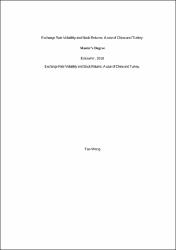| dc.contributor.advisor | Sayılır, Özlem | |
| dc.date.accessioned | 2020-06-29T11:54:01Z | |
| dc.date.available | 2020-06-29T11:54:01Z | |
| dc.date.issued | 2018 | en_US |
| dc.date.submitted | 2018 | |
| dc.identifier.uri | https://hdl.handle.net/11421/23537 | |
| dc.description.abstract | This study analyzes the relationship between stock returns and exchange rate volatility in China and Turkey from 1990 to 2016. GARCH(1,1) model is employed to estimate the volatility of exchange rate. ADF unit root test is used to test for stationarity of the series. Then, relation between exchange rate volatility and stock returns is modelled with OLS Regression and Granger Causality methods. The OLS Regression results show no evidence of an impact of exchange rate volatility on stock returns in China or Turkey. On the other hand, OLS Regression results exhibit that GDP has a significant and positive impact on stock returns in Turkey and China. Regarding Granger causality findings, there is evidence of causality from exchange rate volatility to stock returns in Turkey. Moreover, Granger causality from GDP to stock returns in Turkey is found. In China, the Granger causality runs from stock returns to GDP. | en_US |
| dc.language.iso | eng | en_US |
| dc.publisher | Tez (yüksek lisans) - Anadolu Üniversitesi | en_US |
| dc.rights | info:eu-repo/semantics/openAccess | en_US |
| dc.subject | Exchange Rate Volatility | en_US |
| dc.subject | Stock Returns | en_US |
| dc.subject | Granger Causality | en_US |
| dc.title | Exchange rate volatility and stock returns: a case of China and Turkey | en_US |
| dc.type | masterThesis | en_US |
| dc.contributor.department | Anadolu Üniversitesi, Sosyal Bilimler Enstitüsü, İşletme Anabilim Dalı | en_US |
| dc.relation.publicationcategory | Tez | en_US |
| dc.contributor.institutionauthor | Wang, Tao | |


















